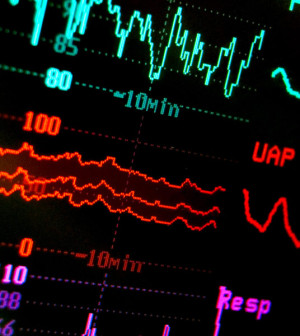- Could Your Grocery Store Meat Be Causing Recurring UTIs?
- Are You Making This Expensive Thermostat Error This Winter?
- Recognizing the Signs of Hypothyroidism
- 10 Strategies to Overcome Insomnia
- Could Artificial Sweeteners Be Aging the Brain Faster?
- Techniques for Soothing Your Nervous System
- Does the Water in Your House Smell Funny? Here’s Why
- Can a Daily Dose of Apple Cider Vinegar Actually Aid Weight Loss?
- 6 Health Beverages That Can Actually Spike Your Blood Sugar
- Treatment Options for Social Anxiety Disorder
Mouse Study Suggests Stem Cells May Reverse Stroke Damage

Research in mice shows it may be possible to reverse brain damage after a stroke.
“No one in the stroke field has ever shown this, so I believe this is going to be the gold standard for future studies,” said senior study author Berislav Zlokovic, director of the Zilkha Neurogenetic Institute at the University of Southern California.
The experimental treatment combined transplanted neural stem cells with a protein called 3K3A-APC, the scientists said.
In mice, the protein triggered the stem cells to become functioning neurons. But animal research does not always pan out in humans.
“We showed that 3K3A-APC helps the grafted stem cells convert into neurons and make structural and functional connections with the host’s nervous system,” Zlokovic said in a university news release. Zlokovic is also a scientific founder of ZZ Biotech, a company that is developing treatments with the protein used in this trial.
Jim Koenig, a program director at the U.S. National Institute of Neurological Disorders and Stroke (NINDS), said that the “study could pave the way for a potential breakthrough in how we treat people who have experienced a stroke.” NINDS funded the research.
“If the therapy works in humans, it could markedly accelerate the recovery of these patients,” Koenig added.
Zlokovic and his team now want to conduct a clinical trial to test whether this therapy is effective in people with strokes. If it’s successful, they plan to test the therapy in treating other neurological conditions, such as spinal cord injuries.
In an ongoing clinical trial funded by the U.S. National Institutes of Health, 3K3A-APC alone is being given to patients within a few hours of ischemic stroke (blocked blood flow to the brain), to determine if the protein can help protect against brain damage.
Close to 800,000 Americans suffer a stroke every year, according to the U.S. Centers for Disease Control and Prevention.
More than 70 percent of those who survive a stroke have to live with muscle weakness or paralysis, said study co-lead author Yaoming Wang, a senior research associate at the Zilkha Neurogenetic Institute.
“The need for an efficacious, practical and late treatment of stroke remains unmet,” Wang said in the news release. “Regenerative medicine with stem cells holds great promise for the treatment of stroke.”
The study was published Aug. 22 in the journal Nature Medicine.
More information
The American Academy of Family Physicians has more on stroke.
Source: HealthDay
Copyright © 2026 HealthDay. All rights reserved.










